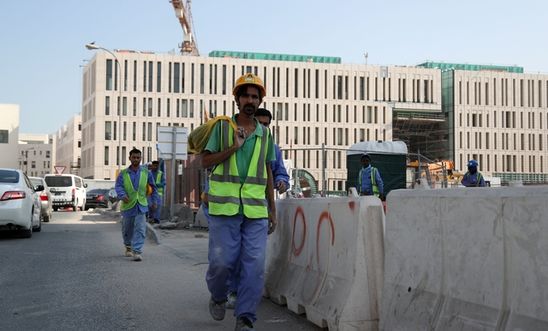
Press releases
Qatar's lifting of travel restrictions for many migrant workers welcomed

‘Law No 13’ means majority of country’s 1.9m migrant workers now free to leave country without employer’s permission, though domestic workers not covered
Country urged to make wider labour reform a key ‘legacy’ of the 2022 World Cup
‘It is imperative that Qatar builds on this new law and abolishes the exit permit for all migrant workers’ - Stephen Cockburn
Qatar’s new law partially scrapping the “exit permit” that prevents migrant workers from leaving the country without their employer’s permission is an important first step towards dismantling its exploitative sponsorship system, Amnesty International said today.
Law No 13 of 2018, issued by the Emir of Qatar yesterday, removes the powers of employers to ban the vast majority of migrant workers - those covered by the country’s Labour Law - from leaving the country. However, employers can still request exit permits for up to 5% of their workforce, depending on the nature of their work. Other employees such as domestic workers who fall outside of the Labour Law are not yet covered by the reform.
According to Qatar's Ministry of Development Planning and Statistics, there are more than 1.9 million migrant workers in the country - about 90% of the country’s total population - mainly from South and South-East Asian countries, including India, Nepal, Pakistan, the Philippines and Bangladesh. Many are working on infrastructure projects linked to Qatar’s hosting of the 2022 FIFA World Cup.
Stephen Cockburn, Amnesty International’s Global Issues Deputy Director, said:
“Qatar’s partial abolition of the exit permit finally grants hundreds of thousands of workers the right to leave Qatar without their employers’ permission, and is an important first step towards meeting the authorities' promise to fundamentally reform the exploitative sponsorship system.
“However, it is essential that further steps are taken to ensure all migrant workers in Qatar are freed from travel restrictions, including domestic workers who remain at risk of continued exploitation and abuse. There should be no exceptions to protecting fundamental human rights.
“Domestic workers - usually women - are often those most vulnerable to abusive employers. They should never be subjected to exit permits that remove their ability to escape exploitation, or to return home to their families.
“It is imperative that Qatar builds on this new law and abolishes the exit permit for all migrant workers.”
Domestic workers await new rules
While Law No 13 does not cover workers who fall outside of Qatar’s Labour Law, it states that the regulations and procedures regarding this category of workers will be outlined in a future ministerial decision.
Amnesty’s research has previously shown how domestic workers are often made to work long hours without days off, and can face severe restrictions on freedom of movement and even physical and sexual abuse. In August last year, Qatar passed a new law providing some legal protection for domestic workers including maximum working hours and annual holidays, yet difficulties in enforcement and the maintenance of the exit visa mean many still find it difficult to escape abusive employers.
Notorious ‘kafala’ sponsorship system
The exit permit is just one part of Qatar’s notorious ‘kafala’ sponsorship system. Amnesty’s research has shown how this system has fuelled widespread abuse and exploitation of migrant workers, including forced labour.
Although most workers no longer need their employers’ permission to leave the country, they still need a “non-objection certificate” from their employer to change jobs. Many employers refuse to provide such certificates, and workers are forced to stay until their contracts finish, which can be up to five years. Workers who leave their jobs without employer permission can be reported for “absconding”, attracting a criminal charge that could lead to arrest and deportation - in contravention of international labour laws and standards. Some employers also continue to withhold workers’ passports, a longstanding practice which may not be illegal in certain circumstances because of a loophole created by Law No 21 of 2016.
Amnesty is urging the Qatari authorities to ensure employers do not use tactics such as passport confiscation or arbitrary travel bans to prevent workers from leaving the country, now that the exit permit is no longer required in many instances.
Stephen Cockburn said:
“Qatar’s World Cup legacy can be the transformation of its labour system from one that drives exploitation to one that provides an example for the region. There remains a huge amount to do, and fully abolishing the exit permit should be one step among many in achieving that. Workers’ rights should not be in the hands of their employers.”
ILO agreement
The exit permit reforms are part of a three-year Technical Cooperation Project agreed with the International Labour Organisation last October following the uncovering of labour abuses by Amnesty and others. Under the project, Qatar committed to revise its laws in line with international labour standards and ultimately to substantially reform the sponsorship system. Sponsorship systems are in place in other Gulf countries, Jordan and Lebanon, although Saudi Arabia remains the only other country to retain the exit permit.
In May this year, Qatar ratified two international human rights treaties related to workers’ rights: the International Covenant on Civil and Political Rights which provides for the right to freedom of movement, but included a ‘reservation’ rejecting the right of migrant workers to form trade unions; and the International Covenant on Economic, Social and Cultural Rights, which provides for the right to decent working conditions.